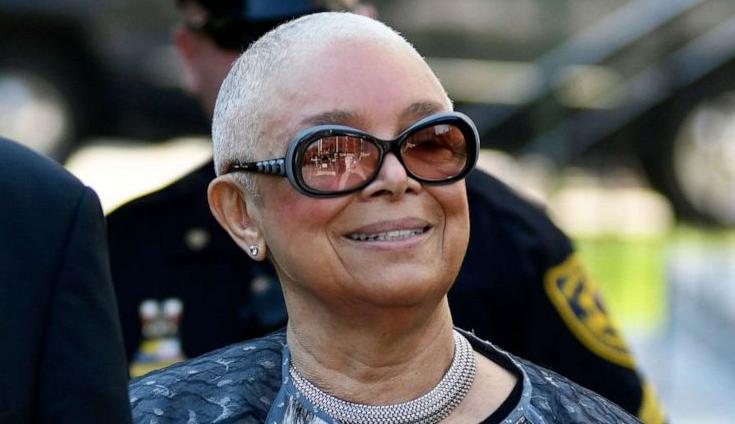
*Phylicia Rashad is probably best known to most folks as Claire Huxtable the wife of Dr. Heathcliff ‘Cliff’ Huxtable (Bill Cosby) on the classic and groundbreaking 80s (NBC) TV series, “The Cosby Show.”
Well, trust us, she’s much more than that. Rashad has created a legacy of excellence in film and television acting and has recently set off to do the same in the director’s seat, commanding veteran actors and newcomers, alike, towards the same level of excellence in theater that she has held for herself. In fact, she’s in charge of the hit play “Immediate Family” from playwright Paul Oakley Stovall which is currently playing at the Mark Taper Forum at the Music Center in Los Angeles.
EURweb associate Troy Tieuel spoke with the Tony Award® winner about her involvement in the production.

Speaking with Rashad is akin to stepping into your favorite classic episode of “The Cosby Show.” Her humble demeanor hiding behind lips that smile and release the same wisdom Claire Huxtable was known for. Hardworking, not afraid to speak intelligently and articulate, Rashad explains how she got into theater directing.
“[My directing] didn’t start by me saying that, ‘I wanted to direct,’” explained Rashad. “My venture into directing began with an invitation from Constanza Romero, whose husband was August Wilson. She invited me to direct a production of August Wilson’s ‘Gem of the Oceans’ at the Seattle Repertory Theater. I said, ‘Yes,’ and that’s how it began. That was the first production that I directed.”
August Wilson’s ‘Gem of the Ocean’ garnered Rashad her first Tony Award nomination as a director and national acclaim.
“A couple of years later,” Rashad continued, “Ren Brown, the artistic director of Ebony Repertory Theater here in Los Angeles, invited me to direct a production of ‘A Raisin in the Sun’ and I did. After that, Center Theatre Group extended an invitation to me to come and direct at the Mark Taper Forum, ‘Joe Turner’s Come and Gone.’”
It’s hard to parallel one director from another, in terms of style, without taking into account the finished product, the play, running over a series of sessions from opening to closing. Each showing is different and each time all involved must contend with a new set of challenges and unpredictable changes. Rashad, in her usual, modest tones describes her approach to directing.
“I read the play, with the sincere effort to discern what is the playwright is saying,” adds Rashad. “That’s how it starts. Then there is the creative team. You assemble the lighting, the set, costume design, and choose the stage management to work in conjunction with [the director].”
“Then it’s casting. Casting is always a very interesting process for me, because I’m seeing very fine actors and trying to put together a group that will work well together and will bring that story to life. That is when we actually get into ‘The Room,’ as it is called, that is the rehearsal room.”
“I never come into a rehearsal with a set idea of how things are going to look and how they are going to go. I have been working with the set designer before I get to the first day of rehearsal. We have designed the set together. By that, I mean, we collaborate. I look at things and elements, make certain suggestions, always letting the designer do the work, because the designer knows. When we come into the room [the set design] is the one thing that is fixed.”
“As the actors are reading the script,” she continued, “we begin to talk about the script. We begin to talk about the script in terms of the overarching themes; we talk about the script in terms of each character’s journey in the story. We don’t say everything, because if you say everything so much magic is lost. But we say enough to stimulate each other.”
“Then I get the feel for how many times we are reading this script at the table, because we did allot of table work with [Immediate Family]. More than I normally do. And then I can feel and sense when the actors are ready to get up from the table.”

“They want to be on their feet and start what’s called ‘Blocking.’ That’s actually positioning actors on the stage, our entrances and our exits. At first it’s quite preliminary, call it skeletal blocking. It’s just enough to get us through to where we are moving. Scripts leave the hands, people begin working without the scripts, and as surely as we are engaged in some authentic exchange, and I’m talking about actors with directors, actors with actors, and actors with directors, the blocking becomes refined. The subtleties, the nuances and the intentions that we discover, allot of what I see, and shaping and molding that. It’s like painting a picture. That’s the way I see it.”
“Then there comes a stage after we have been in the rehearsal hall for a while, after our first, what we call our ‘Stumble Through,’ where we do the whole thing. Then we begin to refine scenes and look through and do ‘run through’s every day, so we get accustomed to the flow of the show, and the actors can begin to feel the threads that need to be connected in their individual character’s journeys and stories and how to relate to one another.”
“That’s what we call, ‘Finding the Play.’ Surely enough, as soon as we have found the play in the rehearsal hall, it’s time to go to the theater and we lose the play. When you get on stage with sets, and props and lights and costume and wigs and those other elements, the play goes away and you have to rediscover it again with these new elements. That’s what we do.”
The play is crafted in its conception by the playwright; in a similar way that a building is conceptualized by an architect’s drawing. The Architect then gives his creation a construction manager who is tasked with the job of actually building or bringing to reality this imaginary creation on a real, pre-existing site.
Rashad, as the director of the play, acts as the Construction Manager, who brings to fruition the vision and the ideas of the playwright on the set. For ‘Immediate Family,’ it’s architect is playwright Paul Oakley Stovall, an African American playwright out of Chicago, Illinois.
“[Paul Oakley Stovall] is a renaissance man,” continued Rashad, “He’s poetry, he’s music, he is literature, he is agriculture, he is science, he is public policy, and he is politics. He is a renaissance man.”
Rashad, who’s off-stage personality does not fall far from the one she made popular during her run as the mother on the Cosby Show, shows her maternal values, embracing Stovall as a mother would a son.
“We were doing a stage reading of ‘Charleston Oleo’ in Jackson Mississippi, and he was part of that cast. So we worked a couple of days together. When we were saying good-bye, he said, “I have a couple of plays that I have written and I’d like to send them to you,’ and he did. ‘Immediate Family’ was one of them and it was about three weeks after he sent the play to me, he called me and he said, ‘Oh, by the way, did I ask you to direct this play?’”
Human rights are a theme throughout our nation’s past, and remains even today as a topic that cannot be ignored. The play ‘Immediate Family’ deals with the rights of people to have the type of life that they want, despite the opinions and feelings of others around them. Homosexuality is a theme throughout ‘Immediate Family,’ but according to Rashad, is not the focus.
“This play is about adult siblings,” corrected Rashad, “this play is about acceptance. This play is about self-acceptance, and this play is about accepting people that we love and seeing them as they see themselves. This play is about family. When you talk about family, you’re going to talk about race, religion, you’re going to talk about politics, and you’re going to talk about sexuality. These things come into play with family.”
“This play suggests a number of things, about this particular father,” explained Rashad, “That he was strong in his home and in his community. He was quite human. I don’t know how well he connected with his children, really. But that didn’t mean that he didn’t love them. It’s something being human, isn’t it? Being human is quite an undertaking.”
Ms. Phylicia Rashad has proven herself as a no nonsense lady, and has been successful at captivating audiences and a stage actress, television actress and has now stepped into the field of directing stage plays. The future is bright for Mrs. Rashad.
For more information on Phylicia Rashad’s play ‘Immediate Family,’ go to www.centertheatregroup.org/.
We Publish News 24/7. Don’t Miss A Story. Click HERE to SUBSCRIBE to Our Newsletter Now!





